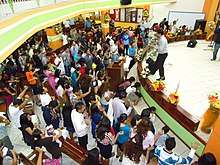glossolalia
English
WOTD – 23 January 2018
Etymology

Young Pentecostals praying and engaging in glossolalia (speaking in tongues, sense 1) at the Center of Fait Emanuel of Assemblies of God in Cancun, Mexico
glosso- + -lalia, from Ancient Greek γλῶσσᾰ (glôssa, “tongue; language”) (ultimately from Proto-Indo-European *glōgʰs) + λᾰλῐᾱ́ (laliā́, “talking; form of speech, dialect”) (from λᾰ́λος (lálos, “talkative”) + -ῐ́ᾱ (-íā, “suffix forming feminine abstract nouns”)).
Pronunciation
- (Received Pronunciation) IPA(key): /ˌɡlɒsəˈleɪlɪə/
- (General American) IPA(key): /ˌɡlɑsəˈleɪlɪə/
- Rhymes: -eɪliə
- Hyphenation: glos‧so‧la‧lia
Noun
glossolalia (plural glossolalias)
- Speaking a language one does not know, or speaking elaborate but apparently meaningless speech, while in a trance-like state (or, supposedly, under the influence of a deity or spirits); speaking in tongues. [from late 19th c.]
- Synonyms: glossolaly, speaking in tongues, speaking with tongues
- 1869, Franz Delitzsch; Robert Ernest Wallis, transl., A System of Biblical Psychology. [...] Translated from the German, (Second Edition, Thoroughly Revised and Enlarged,) [...] (Clark’s Foreign Theological Library, Fourth Series; XIII), 2nd English edition, Edinburgh: T. & T. Clark, 38, George Street; London: Hamilton and Co.; Dublin: John Robertson and Co., OCLC 16308481, page 426:
- [Adolf Bernhard Christoph] Hilgenfeld, indeed, is mistaken in explaining the unintelligibility of the γλω̑σσαι, only by the transcendent nature of what they expressed to the merely human consciousness; but he observes with great truth, that that which is common to prophecy and to glossolalia consisted in the exaltation of the consciousness above the merely human sphere, but that which is distinct consisted in this: that he who was prophetically inspired was in the full possession of his reflecting spiritual powers; […] [W]e showed that there is a human πνευ̑μα in a narrower sense, a capacity of immediate perception and insght. As all ecstasy, so also glossolalia was perfected in this πνευ̑μα: it was a miraculous agency of the Spirit of God […]
- 1877, Heinrich August Wilhelm Meyer; Paton J. Gloag, chapter II, in William P[urdie] Dickson, editor, Critical and Exegetical Handbook to the Acts of the Apostles. [...] Translated from the Fourth Edition of the German [...] (Critical and Exegetical Commentary on the New Testament; I), volume I (The Acts of the Apostles), Edinburgh: T. & T. Clark, 38 George Street, OCLC 711786223, page 67:
- The occurrence in Acts ii. is therefore to be recognised, according to its historical import, as the phenomenon of the glossolalia, (not as a higher stage of it, in which the foreign languages supervened, Olshausen), which emerged for the first time in the Christian church, and that immediately on the effusion of the Spirit at Pentecost,—a phenomenon which, in the sphere of the marvellous to which it belongs, was elaborated and embellished by legend into a speaking in foreign languages, and accordingly into an occurrence quite unique, not indeed as to substance, but as to mode […], and far surpassing the subsequently frequent and well-known glossolalia, having in fact no parallel in the further history of the church.
- 1972 September, William J. Samarin, “Sociolinguistic vs. Neurophysiological Explanations for Glossolalia: Comment on Goodman’s Paper”, in Journal for the Scientific Study of Religion, volume 11, number 3, Blackwell, ISSN 0021-8294, JSTOR 1384556, OCLC 57197167, page 293:
- But glossolalia by definition makes no such sense, because it consists of strings of syllables, made up of sounds taken from all those that the speaker knows, put together more or less haphazardly but emerging nevertheless as word-like and sentence-like units because of realistic, language-like rhythm and melody.
- 1982, Felicitas D. Goodman; Jeannette H. Henney; Esther Pressel, “Chronology of Events”, in Trance, Healing, and Hallucination: Three Field Studies in Religious Experience, Malabar, Fla.: Robert E. Krieger Pub. Co., →ISBN, LCCN 80020043, OL 8272012M, page 301:
- Lorenzo is still kneeling at the box, once more Luisa wipes her eyes, Violeta is sobbing and rocking, her glossolalia now at the -sə-sə-sə-level of near exhaustion.
- 2012, Andy Martin, “Text Messenger”, in Literary Review, London: The Literary Review & Quarto, ISSN 0144-4360, OCLC 633283688, page 404:
- Everything was a labyrinthine amalgam of languages, a towering Babel of puns and glossolalia.
- Synonym of xenoglossy (“knowledge of a language one has never learned”).
- 2000–2001 winter, “Speaking Martian”, in Cabinet: A Quarterly Magazine of Art and Culture, number 1, Brooklyn, N.Y.: Immaterial Incorported, ISSN 1531-1430, OCLC 974140360, archived from the original on 8 July 2017:
- As he indicated in the subtitle of his study, [Olivier] Flournoy regarded [Hélène] Smith's Martian as a kind of "glossolalia." In this category, he also included her "Hindu," "Ultra-Martian," and the other extraterrestrial tongues that she would later speak.
-
Usage notes
- Some writers distinguish glossolalia from xenoglossy, taking the former to mean roughly “speaking a language one does not know” and the latter to mean roughly “knowledge of a language one has never learned”. Others do not distinguish the two, using the terms interchangeably or using one term exclusively. When in doubt, it may be preferable to preserve this distinction, and/or to explain what one means when using each term.
Derived terms
Translations
speaking in tongues
|
|
xenoglossy — see xenoglossy
Further reading

This article is issued from
Wiktionary.
The text is licensed under Creative
Commons - Attribution - Sharealike.
Additional terms may apply for the media files.